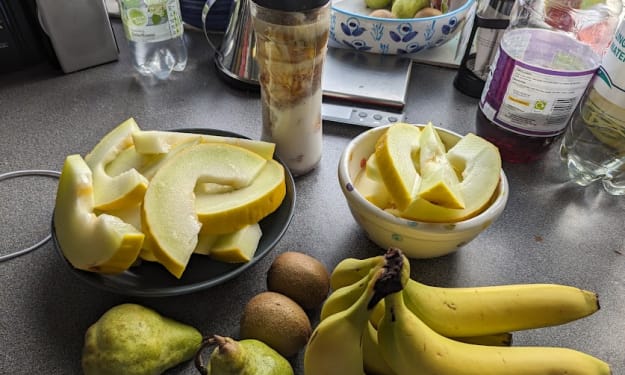What 'Budget-Friendly' Meal Prep Seems to Forget
Meal prep is the latest trend to budget effectively, but many of its proponents don't understand why someone might not be able to afford it.

If you have even the slightest interest in cooking, you've probably fallen down a similar rabbit hole—watching budget-friendly meal prep videos on Youtube:
"$20 Meal Prep for 1 Week!"
"$40 Meal Prep for Family of 4"
"4 Meals under $2"
And so on. As a health conscious penny pincher, I'm always interested in eating healthier, greener, and cleaner for cheaper. So I definitely fall into the trap of watching hours of helpful tips and tricks to cut your spending just a little.
However, with these videos comes a more dangerous idea: that everyone, including the poorest of Americans, if they really wanted to, could eat perfectly healthy, economical square meals every day. The fact that they don't isn't actually because of their poverty; it is because of their lack of nutritional education, or because they're lazy, or whatever inane reason you can think of. This is extra prevalent in vegan communities, with the argument that those who don't switch over to veganism because it's too expensive are lying or addicted to meat.
Obviously, these sorts of videos can and do help people (including myself). But these Youtube channels do not share universal experiences with people, and acting as if everyone can shop, cook, and clean exactly as they do is short-sighted at best.
Appliances
Let's face it—cooking takes a lot of tools. You need knives, cutting boards, food processors, blenders, graters, pots, skillets, sheet pans... The list goes on. These tools are especially important to meal prep, especially when it comes to cutting down on time.
That being said, nearly every person's video or blog post that talks about their weekly meal prep budget doesn't talk about the investments they made to be able to make what they do.
For instance, a high-scale blender like the Vitamix is just under $300 at the cheapest, but it can run up to $600 for nicer models. You might think, "Well, I can just use a cheaper blender," but certain recipes, like "nice" cream or homemade almond butter, can't be made without a high-speed blender. Put a bunch of frozen bananas or whole almonds into a regular blender and you'll have a worn-out motor on your hands very quickly.
Quality knives, pots, and frying pans can cost quite a bit of money as well. While these investments will eventually save you money in the future, it's hard to say that they're affordable for everyone.
Terry Pratchett's Men at Arms succinctly makes this point:
The reason that the rich were so rich, Vimes reasoned, was because they managed to spend less money.
Take boots, for example. He earned thirty-eight dollars a month plus allowances. A really good pair of leather boots cost fifty dollars. But an affordable pair of boots, which were sort of OK for a season or two and then leaked like hell when the cardboard gave out, cost about ten dollars. Those were the kind of boots Vimes always bought, and wore until the soles were so thin that he could tell where he was in Ankh-Morpork on a foggy night by the feel of the cobbles.
But the thing was that good boots lasted for years and years. A man who could afford fifty dollars had a pair of boots that’d still be keeping his feet dry in ten years’ time, while the poor man who could only afford cheap boots would have spent a hundred dollars on boots in the same time and would still have wet feet.
This was the Captain Samuel Vimes ‘Boots’ theory of socioeconomic unfairness.
People who don't have money to spare can't invest in nice things that will bring them a return on investment later. Rather, they're stuck with the inferior, but more immediately affordable option.
Time
Like it or not, time is another tool you need to cook. Poor people do not have the same amount of time in the day as a rich person, or even as much as your average middle-class family. Public transit notoriously takes 2-3 times as long as your own transportation, rotating shifts can seriously mess up your schedule, and having to work overtime or spend time side-hustling takes away time in the kitchen.
"But," you might say, "meal prep only needs to take 1-3 hours. You can do all your cooking on Sunday, and you'll have all meals prepared for the week!"
That's true.
What that incorrectly supposes is that there exists at least one day of the week you aren't working or dealing with something other than cooking, and that you have enough energy to handle cooking for 1-3 hours straight.
Many people have to work the full 7 days a week, so there is no off-day. If you work a job in customer service, or if you work in any labor-intensive field, you may be wiped out for the rest of the day. No one wants to babysit a stove when they're mentally and physically fried.
Clean-up is another thing: whatever dishes you used have to be cleaned and should be cleaned fairly quickly. Even if your meal prep only took a couple of hours to make, you're still left with clean-up. People with no dishwashers or broken ones also have to then stand over a sink, scrubbing each dish for a good hour or two.
These are all worth it for the standard 9-5 worker, where life is at a point where maximizing health is the priority. For those who do truly need budget-friendly meals, time is simply not a luxury they have. Getting at least adequate nutrition, even if it comes straight from a can or from a fast food chain, is the best that some people can do.
Grocery Options
Have you ever seen an avocado in a "budget-friendly" meal prep video? I have. The blogger is usually from California, where avocados are locally grown. For those who live further away, like the East Coast, avocados are not $1—in some places, they can be up to two to three times as much.
(This can vary even within states—I've seen California prices comparable to other states, and I've seen someone in New York claim avocados were $5 a pop. However, that proves my point: everyone's budget-friendly food options are different.)
Foods grown locally and in season tend to be less expensive. Living in the South, I have a lot of options for cheap fresh fruits and vegetables, because there's a lot of agriculture, and specifically food crops being grown near me. I understand, however, that someone living in Montana or Maine might pay more than I do for fresh Georgia or South Carolina peaches.
The topic of food deserts also remains a massive issue. For places without grocery stores, getting the most healthified fresh food can be difficult or impossible. Some places only have corner-store bodegas, which may not be stocked with fresh produce (though more bodegas offer fruits and veggies lately). While some people debate whether access to healthy foods really change people's diets, there are some who don't even have options.
Some videos also recommend hitting up your local Asian or Indian grocery store to get the best prices for some foods and spices. I do not have an Asian or Indian market in my area, and I'm willing to bet many people, especially those living in less diverse locations, don't either.
Miscellaneous
There are, of course, a billion reasons why someone can't do "budget-friendly" healthy meal prep.
For instance, the food itself. If you're autistic, or have an autistic child, you know that textures and flavors can be very difficult to manage in food. If your tastes don't allow you to choose more healthy or affordable foods, you may have a hard time keeping your food budget low.
A lot of cheap food also happen to be allergens. Wheat, soy, meat, peanuts, and dairy are all common allergens, and yet meal prep content often include at least some of these foods. Others may be allergic to other foods—I know of someone who is allergic to most fruits. I myself am allergic to raw carrots and apples. Obviously, if you're allergic to more affordable foods, you might have a harder time with meal prep than others.
And finally, your mental health is key in every situation. You don't have to be poor to be unable to meal prep. If you have depression, doing anything can feel impossible; cooking a week's worth of food in one go would likely be overwhelming. Other disabilities, mental or otherwise, can make meal prep that much harder on you.
***
While meal prep is often the right and good option for many of us, we should remember that not everyone can or even should eat like us. While this article detailed why someone wouldn't be able to meal prep, it's also perfectly fine to not want to do that.
It's not laziness to prioritize something else in life, and doing what keeps you happy and mentally healthy supersedes what keeps you disciplined and physically healthy. And if being disciplined about your food choices and physical health makes you happiest, more power to you.
In the end, we should try a little to avoid judging each other. Spreading information on how you could make a meal healthier or more affordable remains one of the best parts about food blogs and channels. Just leave the expectations and judgments out, please.
About the Creator
Haley Booker-Lauridson
Haley is a passionate freelance writer who enjoys exploring a multitude of topics, from culture to education.







Comments
There are no comments for this story
Be the first to respond and start the conversation.